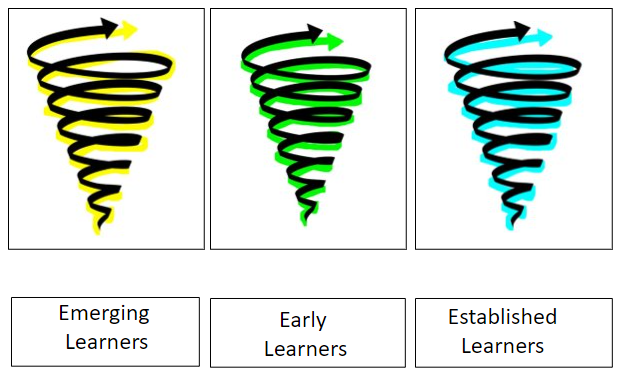Our Learners
Learner Characteristics
All our learners are unique in their strengths and abilities, the challenges they face, the ways the prefer to learn and their interests and motivations. However, in the organisation and delivery of our curriculum, we have found it helpful to group our learners into three broad learner ‘types’. Pupils in each group have similar characteristics in their learning needs and require similar approaches to the way the curriculum is delivered. We therefore refer to our learners as ‘Emerging’, ‘Early’ and ‘Established’ Learners. We formerly referred to them as ‘Pre-formal’, ‘Semi-formal’ and ‘Formal’ as these are terms which are often used amongst special schools.
It is important to note that our curriculum is organised in such a way that pupils are not restricted by their learner ‘type’ in the opportunities they have to progress and develop. See our curriculum map for how we organise it.
Emerging Learners
The our emerging learners have the most profound and complex needs. They generally have physical difficulties combined with cognitive processing needs, sensory needs or complex health needs. Our emerging learners rely on facial expressions, vocal sounds, body language and exhibit a range of behaviours to communicate. Some of them may use a small range of formal communication; others may not have reached the stage of using intentional communication.
Teachers focus on the development of early communication, social, emotional and cognitive skills that are a pre-condition to learning, the development of positive relationships with familiar adults and the development of behaviours through which they can communicate, in order to explore the world around them using their sensory and physical capabilities to the full.
Emerging learners require multi-sensory approaches to learning and programmes which recognise the interrelationship between the skill-set development, how the progress in one set of skills is dependent on that of another.
Programmes and approaches for this group of learners focus on sensory integration, the process of organising and making sense of information acquired through our different sensory systems. Through specialist approaches such as Sensology, or through the use of specialist spaces such as dark dens and sensory rooms, teachers encourage learners to ‘practise the senses’ (Hirstwood, 2005). Teachers may work on stimulating several senses at a time or may support learners to focus on just one or two senses at a time by controlling the amount of sensory stimulus in the environment. This helps develop awareness, increase concentration and builds confidence and social and communication skills.
Movement also plays a key role in the teaching programmes of our emerging learners. The research shows that when it is built into learning experiences, cognitive development accelerates, pupils become more communicative and learning is accelerated. It helps learners develop an awareness of their body in space and what is happening to their body when they move and interact with others.
For more information on some of the specialist approaches used with this group of learners particularly, visit our Professional Development Resources page on this website.
Early Learners
Our early learners have a range of severe complex learning difficulties and disabilities. They may have well developed skills in some areas yet significant difficulties in others. With the right environment and support they will be able to become literate communicators, early readers and mathematical and scientific thinkers.
The right environment for our early learners generally includes one where there is order, structure and routine, where information is presented in lots of different ways many times and good use made of memory aids. Instructions are delivered simply and broken down and where children have lots of opportunity to practice both specific skills and general thinking skills.
Early learners need ‘an environment that is rich and full of opportunities for learning through play’ (Penny Lacey, 2007) and adults who are skilled in providing just the right level of support to scaffold learning without taking away the opportunity for pupil initiated discovery and exploration. ‘Scaffolding’ is a term used in education to describe the act of providing just enough assistance to enable a child to move on from their current understanding to the next level primarily by ‘working it out for themselves’. As well as order and routine, our early learners also need lots of opportunities in their play and activities to resolve problems and build resilience. This is because this requires them to generalise skills, (apply skills learnt in other contexts to new ones) as well as combining them with other skills in order to find solutions.
Early learners typically find generalising and problem-solving difficult as they tend to have difficulty with cognitive processing and working memory. Processing information and using memory to connect it to existing knowledge therefore needs to be taught specifically through modelling, (overt demonstration); using words and actions to do so. Early learners often respond well to functional activities, structured play and a topic based approach.
For more information on some of the specialist approaches used with this group of learners particularly, visit our Professional Development Resources page on this website.
Established Learners
Our established learners have acquired sufficient skills to be able to process and memorise new information and have sufficient working memory to be able to connect it to stored information. They may even be quite good at applying it to new contexts and combining it with other information to problem-solve but all our learners are on their own unique learning trajectory and all of them will be still be learning and building these skills at their own pace in their own way.
Our established learners are able to focus on building additional skills such as teamwork or leadership skills in PD. They may learn how to negotiate or reflect in SEWB, (Social, Emotional and Well-Being) or learn organisational and self-help skills in PCI, (Personal Care and Independence). They may learn how to explain, justify, infer, summarise or debate in Literacy or how to analyse or think creatively in Science and Technology.
